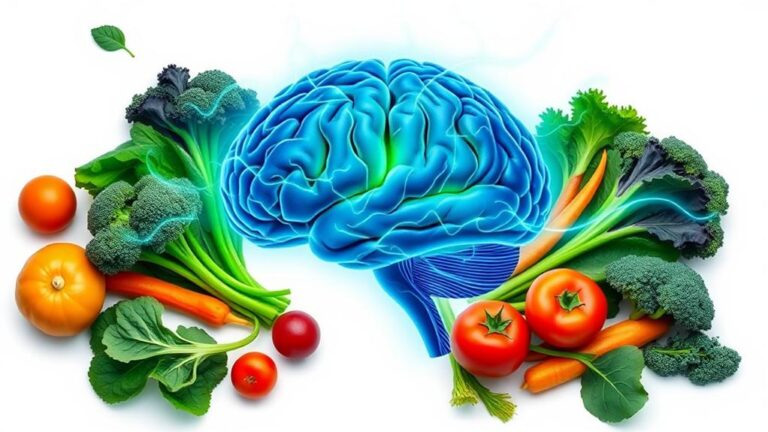Did you know that nearly 30% of people who adopt a low-carb diet report increased energy levels? While many find that cutting carbs helps them feel more alert and focused, the effects can vary greatly from one person to another. You might be wondering how reducing carbohydrates could lead to enhanced energy, or if it could potentially backfire. The balance of macronutrients plays a vital role in this equation, and understanding your body's response is essential to making informed dietary choices. What factors should you consider before making such a change?
Understanding Energy Sources
When you think about fueling your body, it's essential to understand the various energy sources available to you. Your body primarily relies on carbohydrates, fats, and proteins to generate the energy it needs for daily activities. Each source plays a unique role, and knowing how they work can help you make better dietary choices.
Carbohydrates are typically your body's go-to energy source, especially during high-intensity exercises. However, when you cut carbs, your body needs to adapt. Fats become a crucial alternative, providing a steady energy supply during lower-intensity activities. This shift can help you tap into fat stores, potentially aiding in weight loss.
On a keto diet, your carb intake is typically limited to 20-50 grams per day, forcing your body to rely more heavily on fats for energy.
Proteins, on the other hand, aren't primarily used for energy; they're important for repairing tissues and building muscle. In certain situations, like prolonged fasting or intense exercise, your body might turn to protein for energy, but this isn't ideal.
Understanding these energy sources can help you optimize your diet. Whether you choose to fuel with carbs, fats, or proteins, balance is key. By knowing how each source affects your energy levels, you can tailor your intake to best support your lifestyle and goals.
The Role of Carbohydrates
Carbohydrates play a pivotal role in your diet, acting as the primary source of energy for your body. When you consume carbs, your body breaks them down into glucose, which fuels your brain, muscles, and organs. This process is essential, especially during physical activities or when you're engaged in mentally demanding tasks.
Without adequate carbohydrates, you might feel fatigued, find it hard to concentrate, or struggle with endurance. However, low carb diets have gained popularity for their potential benefits in weight loss and improved metabolic health, offering an alternative approach to energy management.
There are different types of carbohydrates, including simple and complex ones. Simple carbs, found in foods like fruits and sweets, provide quick bursts of energy. In contrast, complex carbs, found in whole grains, legumes, and vegetables, offer a more sustained energy release.
This gradual release helps maintain stable blood sugar levels, preventing energy crashes. It's important to recognize that not all carbs are created equal. Choosing nutrient-dense sources can greatly impact your overall health and energy levels.
Benefits of Low Carb Diets
Low carb diets can offer several benefits that appeal to those looking to improve their health or manage their weight. By reducing carbohydrate intake, you may experience various positive changes in your body and overall well-being.
The ketogenic diet, a strict form of low-carb eating, can be particularly effective for some individuals. This diet typically restricts carbohydrate intake to 25-50 grams per day, prompting the body to enter a state of ketosis.
Three key benefits you might notice:
- Weight Loss: Lowering carbs often leads to reduced calorie intake and increased fat burning. This can help you shed those extra pounds more effectively.
- Improved Blood Sugar Control: A low carb diet can stabilize your blood sugar levels, which is particularly beneficial if you're at risk for diabetes or already managing the condition. You may feel more balanced energy throughout the day.
- Enhanced Mental Clarity: Many people report improved focus and cognitive function when cutting back on carbs. This could be due to more stable blood sugar levels and the body using fat for energy instead of glucose.
These benefits can motivate you to make dietary changes that align with your health goals. If you're considering a low carb lifestyle, be sure to monitor how your body responds to find the best approach for you.
Metabolic Adaptation Explained
Metabolic adaptation refers to the body's ability to adjust its metabolism in response to changes in diet and activity levels. When you cut carbs, your body initially reacts by burning through stored glycogen for energy.
Over time, however, your metabolism can slow down as it becomes more efficient at using fewer calories. This means that while you might lose weight initially, your body may start to resist further weight loss.
This adaptation occurs because your body wants to maintain homeostasis, conserving energy when it senses a decrease in caloric intake. If you greatly lower your carb intake, your body may switch to using fat as its primary fuel source.
While this can lead to fat loss, you might also experience fatigue or a drop in energy levels as your body adjusts to this new fuel source.
It's essential to recognize that metabolic adaptation isn't inherently negative. It can be a natural response, but understanding it helps you make informed decisions about your diet and energy levels.
Listening to your body, monitoring how you feel, and being aware of these changes can empower you to optimize your nutrition and energy accordingly.
Tips for a Balanced Approach
Finding a balanced approach to your diet can help mitigate the effects of metabolic adaptation while supporting your overall energy levels. Instead of drastically cutting carbs, consider these tips to maintain energy while enjoying a varied diet:
- Prioritize Whole Foods: Fill your plate with whole, unprocessed foods. These options provide essential nutrients and help stabilize blood sugar levels, keeping your energy consistent.
- Balance Macronutrients: Aim for a mix of carbohydrates, proteins, and healthy fats in every meal. This combination not only fuels your body but also aids in muscle recovery and keeps you feeling full longer.
- Stay Hydrated: Don't underestimate the power of hydration. Drinking enough water is vital for peak energy levels and overall health.
It helps your body efficiently process food and maintain focus throughout the day.
Conclusion
In the end, cutting carbs can boost your energy, but it's not a one-size-fits-all solution. As you navigate your dietary choices, listen to your body and find the right balance for you. Remember, it's all about finding your groove—what works wonders for one person might fall flat for another. So, whether you immerse yourself in a low-carb lifestyle or simply tweak your intake, keep your energy levels and overall well-being in mind.



